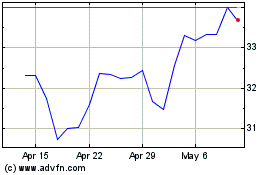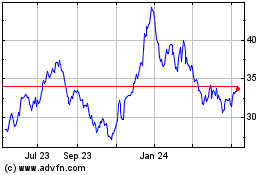Google Builds Motorola Moat - Tactical Trading
August 14 2011 - 8:00PM
Zacks
By the time you read this, you will undoubtedly have heard the big
investment news of the day: Google's (GOOG) $12.5 billion all-cash
acquisition of Motorola Mobility Holdings (MMI). Agreeing to a
take-out share price of $40, the deal is a 63% premium over MMI's
Friday close, and about $1 billion in market cap over its all-time
high.
This is a great lesson in why we pay insane
triple-digit P/E multiples for companies -- or, in the case of MMI,
big "P" for companies with no "E" at all.
What I mean is that we all know that even a great
business concept or growth story can become a bomb of an
investment. But even when earnings visibility is scarce, you never
know when some whale will sweep in and gobble up the asset for some
unseen potential.
Actually, in MMI's case, lots of people probably
saw the potential of this deal because of the technology and
intellectual property "connections" the two companies shared. It's
just that if you were an MMI investor, you had no real guarantee
Google would finally step up.
GOOG Builds a Moat
Here's what I wrote about MMI CEO Sanjay Jha in
June...
Jha thinks the phone will always be the ultimate
device for consumers and business people because it is the one we
carry with us at all times. It is the "digital hub" of people's
lives as he calls it. And therefore he believes that the biggest
opportunities in his industry are the "convergent capabilities" of
computing and communications in a single, handheld device.
Google management probably saw the potential of
someone else scooping up this key partner at much higher prices,
and that possibility posed a real threat to their mobile
strategy.
Why? Because MMI is all about intellectual property
that gives Google a fighting chance to compete with Apple (AAPL).
With over 25,000 technology patents in the MMI vault (over 17k
granted, 7k pending), Google says the acquisition will enable them
to "supercharge the Android ecosystem and will enhance competition
in mobile computing."
Protecting a Big Bet
Peter Kafka, writing for Dow Jones website
AllThingsD.com, gave us some excellent play-by-play of the
conference call this morning. I share some highlights here because
they give great flavor to the "star wars" world of mobile-comm
gadget competition.
Larry Page, Google CEO, said that MMI chief Jha
"made a big bet" by using Android as the sole MMI development
platform a few years ago. Page mentioned the MMI patent portfolio,
"which will help protect" Google from their big mobile competitors,
including Microsoft (MSFT).
Page and Android division head Andy Rubin fielded
several questions about the business dynamics of a platform
provider acquiring a device manufacturing partner. They both said
that it changes nothing, noting that MMI would be run as a separate
business and that it would gain no special advantages over other
Android partners like Samsung.
Rubin, who Page reminded everyone was the
inspiration in 2005 behind the open-source platform for mobile
devices, said this is about "protecting the ecosystem, and
extending it as well."
Asked about FTC hurdles, foreign regulators, and
the perception of anti-trust if no other bidders were considered,
Google Corporate Development head David Drummond acknowledged the
need for regulatory approval in Europe as well as the US.
"We believe this is a pro-competitive
transaction."
Kafka summed up Drummond's additional comments
thus: Android has added competition, user choice, and so
"protecting that ecosystem" is pro-consumer "almost by
definition."
Scale vs. Innovation
MMI CEO Jha knows a thing or three about
competition in the mobile-comm wars. In June, I wrote "Apple Empire
in Danger?" after I saw an interview with Jha talking about
"internal" threats to the dominator of handset magic.
Here's how I described his views then...
"What are Apple's vulnerabilities?" This was the
question posed to Sanjay Jha, CEO of Motorola Mobility this week by
Fortune's Geoff Colvin, Senior Editor-At-Large, on CNNMoney. Jha
first praised and admired the success of Apple in delivering
world-class products. Then he spoke broadly about the challenges of
any giant tech success, saying that "scale and innovation very
often don't mix."
He explained this decline-and-fall thesis by
focusing on what tends to happen when a company is faced with
defending its large market share and its competitive advantages.
"Defensive actions very often set in and middle management begins
to drive the culture and strategy of a company. Not speaking about
Apple in particular, but with the scale that comes with that level
of success, very often is in itself the beginning of a decline
sometimes."
Jha was diplomatic and enlightening in his
analysis. And maybe curiously foreshadowing of his position versus
Apple. Now, he's tied to the other monster of innovation.
And I bet, Sanjay Jha has a new bet now: that he
can continue to innovate despite Google's size and money.
Some eyes may be on Research In Motion (RIMM) now
as a possible acquisition target with its shadow-of-former-self $13
billion market cap.
I'm more interested to see how the empire (aka,
Apple) strikes back.
Kevin Cook is a Senior Stock Strategist for
Zacks.com
APPLE INC (AAPL): Free Stock Analysis Report
GOOGLE INC-CL A (GOOG): Free Stock Analysis Report
MOTOROLA MOBLTY (MMI): Free Stock Analysis Report
MICROSOFT CORP (MSFT): Free Stock Analysis Report
RESEARCH IN MOT (RIMM): Free Stock Analysis Report
Zacks Investment Research
Marcus and Millichap (NYSE:MMI)
Historical Stock Chart
From Jun 2024 to Jul 2024

Marcus and Millichap (NYSE:MMI)
Historical Stock Chart
From Jul 2023 to Jul 2024
